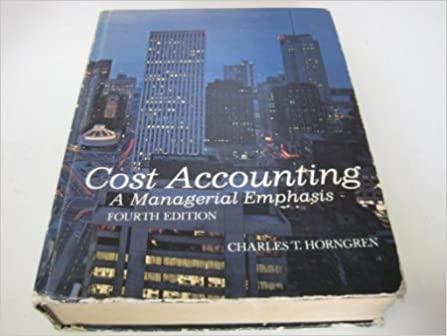Question
Make-or-Buy, Traditional and ABC Analysis Brees, Inc., a manufacturer of golf carts, has just received an offer from a supplier to provide 2,500 units of
Make-or-Buy, Traditional and ABC Analysis Brees, Inc., a manufacturer of golf carts, has just received an offer from a supplier to provide 2,500 units of a component used in its main product. The component is a track assembly that is currently produced internally. The supplier has offered to sell the track assembly for $72 per unit. Brees is currently using a traditional, unit-based costing system that assigns overhead to jobs on the basis of direct labor hours. The estimated traditional full cost of producing the track assembly is as follows: Direct materials $45.00 Direct labor 18.00 Variable overhead 4.00 Fixed overhead 40.00 Prior to making a decision, the companys CEO commissioned a special study to see whether there would be any decrease in the fixed overhead costs. The results of the study revealed the following: 3 setups$1,180 each (The setups would be avoided, and total spending could be reduced by $1,180 per setup.) One half-time inspector is needed. The company already uses part-time inspectors hired through a temporary employment agency. The yearly cost of the part-time inspectors for the track assembly operation is $11,790 and could be totally avoided if the part were purchased. Engineering work: 450 hours, $45/hour. (Although the work decreases by 450 hours, the engineer assigned to the track assembly line also spends time on other products, and there would be no reduction in his salary.) 75 fewer material moves at $30 per move. Required:
1. Ignore the special study, and determine whether the track assembly should be produced internally or purchased from the supplier. Produced internally
2. Now, using the special study data, repeat the analysis. It is $ fill in the blank 2 less expensive to buy outside.
3. Which of the listed items is not a qualitative factor that would affect the decision? The amount of cost savings that can be achieved
4. After reviewing the special study, the controller made the following remark: "This study ignores the additional activity demands that purchasing would cause. For example, although the demand for inspecting the part on the production floor decreases, we may need to inspect the incoming parts in the receiving area. Will we actually save any inspection costs?" Is the controller right?
Step by Step Solution
There are 3 Steps involved in it
Step: 1

Get Instant Access to Expert-Tailored Solutions
See step-by-step solutions with expert insights and AI powered tools for academic success
Step: 2

Step: 3

Ace Your Homework with AI
Get the answers you need in no time with our AI-driven, step-by-step assistance
Get Started


